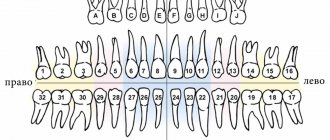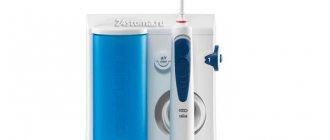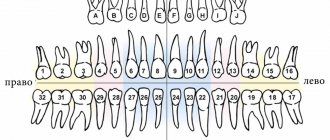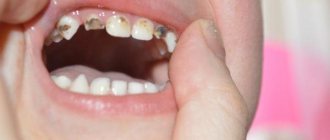Author of the article: Goldstein Maria Anatolyevna
Doctor-expert
Specialization: Dentist-therapist
Total work experience: since 2008
Reading time 7-8 minutes
CONTENTS:
- About tooth enamel
Compound
- Functions
- Diseases
- Why is tooth enamel damaged?
- Indications for strengthening tooth enamel
- How to restore tooth enamel in dentistry
Fluoridation
- Remineralization
- Implantation
- How to strengthen teeth enamel at home
Proper diet
- Folk remedies
- Special means
Enamel is the outer shell of the tooth, which bears the heaviest load (chewing). She is the first to take on the “blows” of active substances contained in food and drinks. In addition, every day, throughout a person’s life, it is the enamel that is subject to friction while chewing food. It is not surprising that over time the question may arise: how to strengthen tooth enamel and what will be required for this? To get a complete answer, you need to learn more about all the features and recovery options.
Content:
- Why is there a need to strengthen enamel?
- Signs in the presence of which you need to think about strengthening
- Products that can help improve the situation
- Dentist advice
- Strengthening techniques used in dentistry
- Pastes and gels
Tooth enamel is one of the hardest tissues of the human body.
But, despite its strength, over the years it gradually collapses and becomes thinner. Then a completely logical question arises: how to strengthen teeth in order to avoid serious dental problems. Violation of the natural structure of the enamel layers is facilitated by eating too hot and very cold foods, smoking, and a love of sweets. Oral health is also negatively affected by the fact that many people do not pay due attention to daily hygiene care. They ignore the need for an annual visit to the dental hygienist.
How to place a crown on an implant?
A crown can be placed not only on a tooth, but also on an implant. This allows you to restore lost teeth without grinding down healthy units in the rows. Crowns on implants are durable, aesthetic, and visually indistinguishable from natural teeth.
Before placing a crown on an implant, an artificial root implantation procedure is performed. As soon as the implant takes root, an abutment is placed on it, and then a crown. Putting a crown on an implant will be more expensive than conventional prosthetics, but the price of the service is fully compensated by the impeccable aesthetics and long service life of both the implant and the crown.
Why is there a need to strengthen enamel?
Caries is one of the most common problems that dentists have to deal with. It is because of its frequent occurrence that many people are forced to look for ways to strengthen their teeth. The disease is caused by:
- genetic predisposition to an abnormal process;
- disruptions in the functioning of the endocrine system;
- severe pathologies of the stomach and intestines;
- untimely removal of soft plaque and hard stone;
- non-compliance with dental cleaning techniques;
- refusal to eliminate non-carious enamel lesions;
- pathological abrasion;
- incorrect bite, due to which it is impossible to properly clean individual interdental areas;
- poor diet, habit of eating a lot of sour and sweet foods;
- alcohol abuse, tobacco addiction;
- habit of chewing foreign objects.
Often the enamel is greatly weakened due to hormonal changes. This is why many expectant mothers become patients in dental clinics.
Reviews
We invite readers who have experience in using enamel restoration methods to share their feedback in the comments to the article.
If you find an error, please select a piece of text and press Ctrl+Enter.
Tags tooth enamel
Did you like the article? stay tuned
Previous article
Teeth are crumbling, what to do in such a situation?
Next article
Oral irrigator Waterpik WP-100 E2 Ultra: what it is, advantages, approximate cost
Signs in the presence of which you need to think about strengthening
You should ask a qualified dentist how to strengthen your teeth if:
- the enamel has acquired an unsightly yellow or gray tint, which is why the smile begins to look less aesthetically pleasing than before;
- when eating sour, sweet, or spicy foods, sharp dental pain periodically appears;
- the coronal part has become transparent in the area of the cutting edge;
- pain occurs when biting and chewing hard foods;
- chips and cracks appeared;
- rapidly progressing caries developed.
In all these cases, you need to make an appointment with a dentist as soon as possible. The doctor will conduct a simple diagnosis and determine what caused the problem, and select medications that will improve the condition of the enamel.
The condition of the teeth should be assessed by a specialist
Parents most often bring their child to the pediatric dentist only when there are already problems with the baby teeth. We practically don’t see healthy children whose parents want to make sure that the child’s teeth are always healthy and never hurt! For some reason, the opinion has now taken root that one cannot live without caries in life. So parents of children who already suffer from toothache and tooth decay come to us. Not all pediatricians talk about this, but parents should know that it is necessary to show the baby to the doctor at 6 months or when the first tooth emerges.
It is important to come to a specialist when there seems to be no cause for concern, because the initial stages of caries may be invisible to a layman. Caries begins when mineral substances are removed from the enamel under the influence of bacteria. As a result, a white spot forms on the surface of the tooth. It may be located in places that are inconvenient for inspection and masked by plaque, so parents may not see it or not attach any importance to it - after all, the tooth remains white.
The alarm begins to sound only when the tooth turns brown or black, a “hole” appears or the enamel chips. In this condition, the tooth requires serious and expensive treatment, which frustrates and disappoints parents.
Therefore, even if the teeth look healthy, you should visit the pediatric dentist every 2-3 months. The dentist’s experience and modern equipment make it possible to identify caries at the earliest stages and stop its development. To do this, for most children it is enough to remove plaque and treat the enamel with special means that will strengthen its structure and reduce the activity of microorganisms.
Products that can help improve the situation
In the human body, a lot depends on nutrition. It is impossible to have a healthy smile if you consume a huge amount of junk food every day. If a person wants to make his enamel resistant to the negative influences of external irritants, he should eat a lot of fresh fruits and vegetables. Also useful:
- Seafood. They are a quality source of phosphorus.
- Fermented milk and dairy products containing calcium.
- Kiwi. This fruit is a real storehouse of ascorbic acid. At the same time, unlike oranges, tangerines and lemons rich in this vitamin, it does not irritate the enamel.
- Greenery. Source of a huge amount of vitamins and microelements. You definitely need to eat it. If a person does not like greens, they should treat them as natural medicine and still use them in their cooking on a regular basis.
- Honey. Beekeepers call it a natural antiseptic. It perfectly relieves inflammation and promotes rapid healing of gum disease.
To strengthen your teeth, it is very important to stop drinking any sweet carbonated drinks, smoking, and alcohol. It is also not recommended to frequently chew nuts and seeds or smoke.
I need to put a crown on a tooth: is the treatment painful?
Statistics show that most people, knowing that they need to put a crown on a tooth, still postpone their treatment for fear of visiting the dentist and the pain that supposedly cannot be avoided with dental prosthetics. Does it really hurt to put a crown on a tooth? Let's look at this issue together.
So is it painful to put a crown on a tooth or not? The most painful stage in the process of installing a crown on a tooth will be the preparation, during which the teeth are treated for caries, depulped (if necessary), and also ground down to the thickness of the future crown. All these procedures are not performed without anesthesia, as they can cause quite severe pain to the person.
Before you begin to treat and prepare the tooth for placing a crown on it, the doctor will definitely perform an anesthesia procedure using a local anesthetic. The type and amount of the drug are selected individually for each patient. The use of anesthesia makes the process of preparing the tooth for crown installation painless.
If the patient experiences a literally panicky fear of dentists, in our dental clinic “Firadent” he may be offered dental treatment in his sleep[/anchor], under sedation. Sedation should not be confused with general anesthesia; it is a light medicated sleep in which the patient will remain during treatment. Sedation allows you to relieve the patient not only from pain when preparing teeth for prosthetics, but also from psychological discomfort and stress! Moreover, after sedation there are no negative side effects, which are not uncommon after general anesthesia.
You can read all the details on dental treatment during sleep in a separate article on our website, which is devoted to sedation, or find out during a consultation with the doctors of our clinic - “Firadent”.
Dentist advice
Doctors emphasize that you need to carefully take care of your oral health and brush your teeth in a timely manner. A high level of hygiene is the basis without which nothing can be achieved at all. If plaque is not removed in a timely manner, thinned enamel, loosening of the molar units, hyperesthesia, and gingivitis will not take long to occur.
At the same time, it is not enough to just brush your teeth in the morning and evening - you need to do it correctly. During the procedure, you should use a high-quality brush and paste (it’s good if your dentist selects them).
To the aid of sensitive and caries-prone units come:
- rinses with anti-inflammatory activity;
- strengthening gels;
- floss;
- professional hygiene.
Pain after prosthetics
After installation of the orthopedic structure, the patient may experience pain. They are mainly caused by either adaptation of oral tissues to the elements of the prosthesis, or the development of inflammatory processes. Pain due to adaptation goes away on its own or after correction of the structure.
But pain after dental prosthetics, caused by inflammation, is fraught with dangerous consequences, so if they last longer than a few days, do not subside, but intensify, are accompanied by an unpleasant odor, the discharge of pus, it is urgent, without delay, to consult a doctor.
The cause of pain may be untreated foci of infection in the oral cavity, infection as a result of errors in the installation of the structure or previous preparatory operations, violation of the rules for using the prosthesis and oral hygiene, allergic reactions to the materials used in dental prosthetics, as well as too tight, or, conversely, , insufficiently tight fit of the prosthesis to the soft tissues.
In order to identify the causes of inflammation and cure it, it is necessary to contact a dental clinic, otherwise this can lead to breakage of the prosthesis, rejection of its structural elements and serious complications.
Strengthening techniques used in dentistry
Experienced dentists use highly concentrated products enriched with minerals when working with “problem” teeth. Additionally, they prescribe fluoride-containing pastes and remineralizing gels to patients, which can be used at home.
This is the name of the most effective dental procedures to strengthen teeth:
- Remineralization. First, professional hygiene is carried out. Using an ultrasonic scaler, the doctor cleans the crowns of deposits. After this, it covers them with a special remineralizing composition. Prepared enamel absorbs beneficial components like a sponge. Due to this, her condition improves. It becomes dense, very hard and perfectly smooth. In advanced cases, one remineralization session may not be enough. Then it is repeated two to four times at certain intervals.
- Fluoridation. Often this type of treatment is combined with remineralization. This is due to the fact that fluoride is better absorbed after calcium. Fluoridation means the treatment of hard dental tissues with a fluoride-containing preparation. It quickly penetrates into the deep layers of the tooth and saturates its tissues, making them more resistant to negative external factors. It is especially important to undergo fluoridation twice a year for people who live in regions where the water flowing from the taps is low in fluoride compounds.
Use of folk remedies
In addition to the usual home procedures and methods, a number of traditional medicine recipes are available on the Internet that help restore enamel:
- A mixture of beet and garlic juices should be applied to the surface of the teeth for a short time, and then rinsed thoroughly with water.
- Rinse for a week or two with a weak warm solution of soda . One teaspoon per glass. Instead of baking soda, you can use sea salt in the same way.
- To brush your teeth twice a week for one and a half months, use two crushed tablets of activated carbon . Wood ash is suitable as a cleaning agent instead .
- Using the white part of the lemon peel . It should be used to wipe and treat the enamel. However, there is a possibility of aggressive effects of this drug.
It is better to refrain from such experiments and buy specialized remineralizing products (gel and paste). Spent 500 rubles. will help save thousands on the treatment of an advanced problem, aggravated by the influence of dubious folk remedies.
Pastes and gels
At home, a person can strengthen enamel by using high-quality dental pastes and gels. Particularly valuable are compositions that include the following components:
- Fluorine. It is better absorbed when presented in the form of sodium fluoride or amino fluoride. Passing through the outer layers of enamel, these components react with hydroxyapatite, the main substance that makes up the upper shell of the tooth. As a result, a strong connection is formed that is not susceptible to the negative effects of bacteria and acids that cause caries. On an ongoing basis, a person can use products containing 1000 ppm of fluoride. If the doctor has prescribed a treatment course for weakened enamel, this indicator can be increased to 1500 ppm. In this case, the drug will also exhibit remineralizing properties. But it is suitable only for course use. If the packaging says that fluoride contains more than 1000 ppm, you should not use the product without consulting a doctor. Such amateur activities often result in fluorosis, a very unpleasant dental disease associated with an excess of fluoride in the body.
- Hydroxyapatite. An excellent remineralizing component. Helps to qualitatively strengthen dental tissues at home. It quickly integrates into the crystal lattice of hard tissues. Even eliminates caries at the spot stage. The compound fills all the small cracks and makes the crown part absolutely smooth, resistant to the destructive effects of bacteria and microbes.
- Amorphous calcium phosphate, glycerophosphate. These substances have the unique ability to form a kind of protective film on the surface being treated. It strengthens the enamel and protects the unit from the destructive influence of harmful factors. It is important to know that these two components are contraindicated for people who are allergic to milk protein.
Natural plant extracts. There are a lot of pastes with plant extracts on sale. Natural ingredients such as propolis, chamomile, sage, lavender, yarrow, and oak bark have proven themselves to be excellent. Of course, they are not as effective as the above-mentioned chemical components. But they have a good effect on the condition of the gums, relieve increased bleeding and provide reliable prevention of gingivitis.
If you are looking for something to strengthen your teeth, then start with professional hygiene. This procedure will prepare the dentition for further activities. Immediately after hygiene, ask your doctor what products he will recommend for you. This approach to therapy is the most effective and completely safe.
Which vitamin complex to choose?
At the present time, it is quite difficult to ensure an uninterrupted supply of vitamins and micronutrients in sufficient quantities through nutrition alone. To maintain immunity and prevent any pathological processes in the body, you have to periodically take a course of vitamins. To do this, you should choose only high-quality and proven complexes. According to expert reviews, the following two drugs, described below, have worked well.
Complex "Calcium D3 Nycomed"
The drug contains bioavailable calcium and vitamin D3 - cholecalciferol. These substances are virtually indispensable for the formation of healthy bone tissue and, accordingly, tooth enamel. The product ensures the formation of a kind of membrane that stimulates cell regeneration and renewal. The complex ensures mineralization of dental tissues from the inside, helps restore gums, nourish them and increase elasticity. Recommended for periodic use from the age of 5 in the dosages specified in the instructions.
The cost of packaging (60 pcs.) is 330-350 rubles.
Vitamins "Centrum Silver"
The multivitamin complex offers a whole range of macro- and microelements beneficial to the body with high digestibility rates. These include substances such as betacarotene, retinol, colecalciferol, ascorbic and folic acids, B vitamins, biotin and other elements important for health. The drug helps restore mineral metabolism in the body, including strengthening hard tissues and the oral mucosa.
Approximate price (30 pcs.) – 500-550 rubles.
Remineralization
If your child has white chalky spots on the enamel, this indicates the first stage of caries development, which means the enamel needs to be strengthened. At this stage, it is still possible to avoid more complex and psychologically inconvenient procedures for children, for example, such as drilling teeth with a drill. As a rule, in this case, a course of procedures is prescribed with an interval of one day. An application is carried out using a medicinal product, which contains flor, calcium and other microelements. To consolidate the results, it is recommended to repeat the course after a few months.










